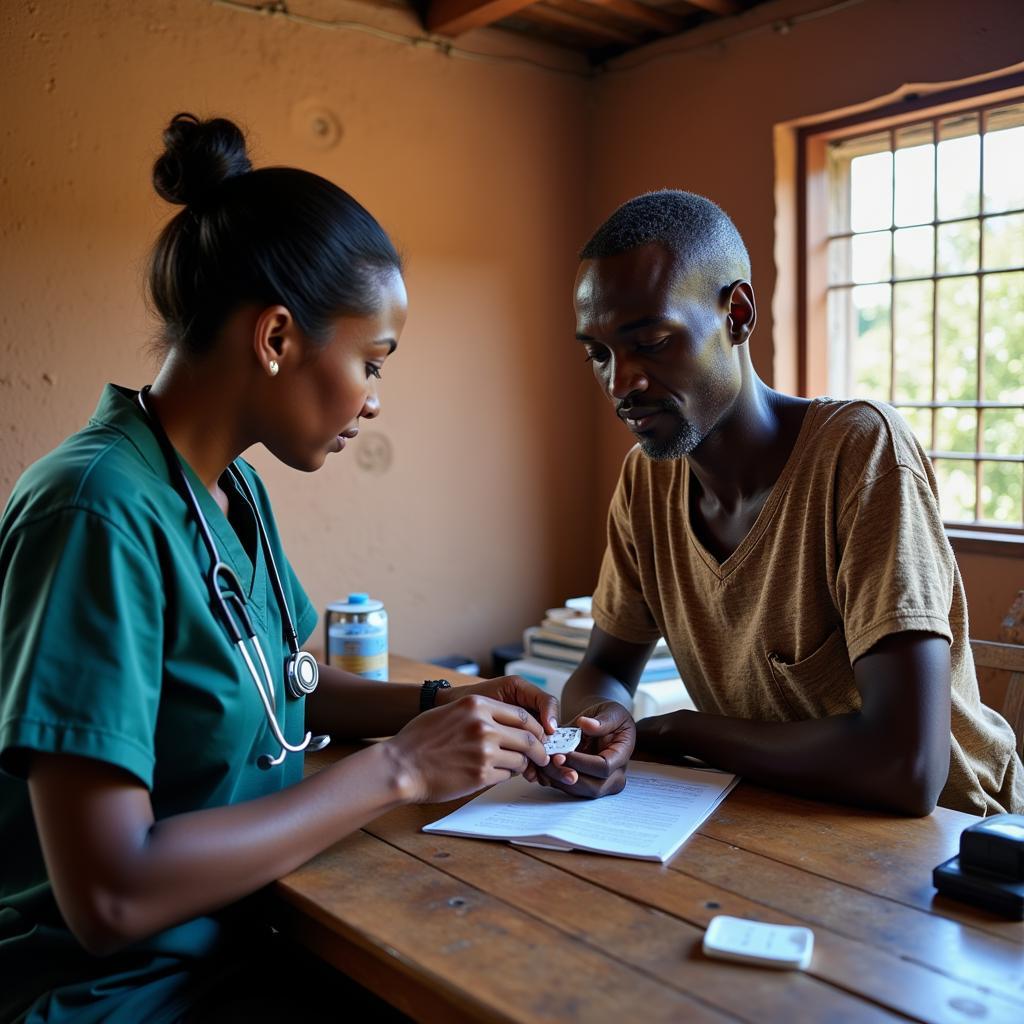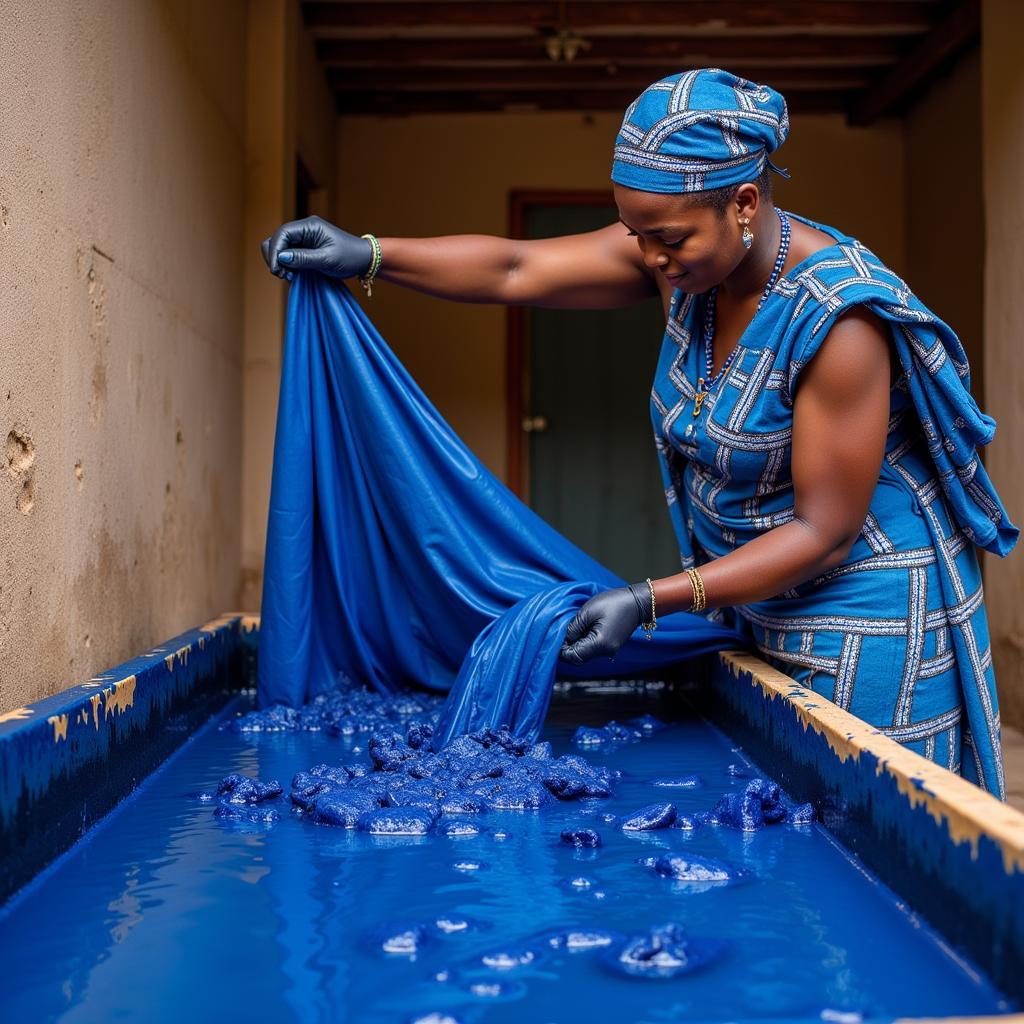Understanding and Supporting African AIDS People
The impact of AIDS in Africa continues to be a significant challenge, affecting millions of “African Aids People” and their communities. This article aims to provide a comprehensive overview of the current situation, exploring the social, economic, and cultural factors influencing the epidemic and highlighting the ongoing efforts to support those affected by HIV/AIDS. After the initial shock and despair, Africa has shown resilience and determination in the face of this epidemic.  Community support for people living with AIDS in Africa
Community support for people living with AIDS in Africa
The Current Landscape of HIV/AIDS in Africa
While significant strides have been made in combating HIV/AIDS globally, Africa remains disproportionately affected. Several factors contribute to this, including limited access to healthcare, socioeconomic inequalities, and persistent stigma. Understanding these complexities is crucial for developing effective interventions. For example, access to antiretroviral therapy (ART) has expanded dramatically in recent years, leading to a significant decline in AIDS-related deaths. However, challenges remain in ensuring consistent access to medication and addressing the needs of specific populations, such as women and children.
How Does HIV/AIDS Affect Daily Life in Africa?
The impact of HIV/AIDS extends far beyond physical health, impacting individuals, families, and communities on social, economic, and emotional levels. It can lead to loss of income, increased poverty, and orphaned children. The social stigma associated with HIV/AIDS often results in discrimination and isolation, making it even more difficult for those affected to access support and services. Many organizations are working tirelessly to provide comprehensive support, including medical care, counseling, education, and economic empowerment programs.
What are the long-term effects of the AIDS epidemic on African societies? The long-term effects are multifaceted, ranging from demographic shifts and strained healthcare systems to the psychological and emotional toll on individuals and communities. Addressing these challenges requires a long-term commitment to sustainable development and social justice.
 Access to healthcare for people living with AIDS in Africa
Access to healthcare for people living with AIDS in Africa
Combating the Stigma Surrounding HIV/AIDS
Stigma remains a significant barrier to accessing HIV testing, treatment, and care. Addressing this stigma requires a multi-pronged approach, including public awareness campaigns, community engagement, and education. Openly discussing HIV/AIDS and challenging misconceptions is crucial for creating a supportive environment for those affected. Understanding the African Diaspora pronunciation can help in communicating effectively with diverse communities affected by the epidemic.
The Role of Community in Supporting African AIDS People
Community-based organizations play a vital role in providing support and care for people living with HIV/AIDS. These organizations offer a wide range of services, from home-based care and support groups to educational programs and income-generating activities. They are often the first point of contact for individuals seeking information and support, and they play a crucial role in connecting people to vital healthcare services. Exploring African love birds images can offer a symbolic representation of the enduring strength of love and companionship in the face of adversity, reflecting the spirit of community support.
The Future of HIV/AIDS in Africa
While the challenges are significant, there is hope for the future. Continued investment in research, prevention, and treatment is essential for achieving the global goal of ending the AIDS epidemic by 2030. Empowering communities and individuals to take an active role in their health is crucial for creating a sustainable future free from HIV/AIDS. For instance, promoting African American dreadlocks styles through community events can help raise awareness and create a sense of belonging for those affected by AIDS. Learning about African girls dark face with small eyes can foster understanding and appreciation for the diverse beauty of African people.
Conclusion
The fight against AIDS in Africa is a complex and ongoing challenge that requires a collaborative and comprehensive approach. Supporting “african aids people” involves addressing the social, economic, and cultural factors that contribute to the epidemic, while simultaneously ensuring access to quality healthcare and combating stigma. By working together, we can create a future where all Africans have the opportunity to live healthy and fulfilling lives free from the burden of HIV/AIDS. You can even find support networks in surprising places, like an African barbershop Chennai.
FAQ
- What is the current prevalence of HIV/AIDS in Africa?
- How can I support organizations working to combat HIV/AIDS?
- What are the main challenges in accessing treatment in Africa?
- What are the long-term impacts of HIV/AIDS on communities?
- What are some successful strategies for reducing stigma?
- How is technology being used to improve access to healthcare?
- What are the latest advancements in HIV/AIDS research?
When support is needed, please contact us via Phone: +255768904061, Email: kaka.mag@gmail.com or visit our address: Mbarali DC Mawindi, Kangaga, Tanzania. We have a 24/7 customer support team.


